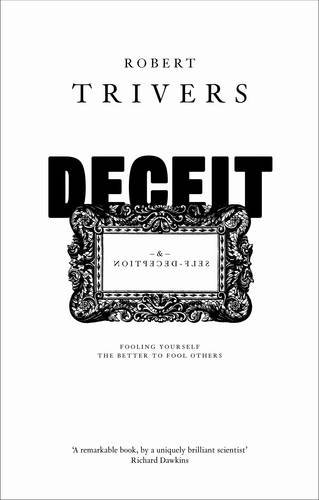Fooling Yourself, The Better To Fool Others


I found this pretty compelling at the time of reading, but now I come to review it, I’m surprised at how little of it has stayed with me. Deceit and self-deception are fascinating facets of life, and I share Trivers’ desire to better understand these areas. But at times I found his writing a little opaque, either just being plain confusing, or assuming knowledge I didn’t have. I feel the best authors of such popular science books (as this appears to want to be), have the skill of making themselves understood. So, whilst I certainly admire Trivers intent, I wasn’t entirely bowled over with the execution.
Much of what Trivers discusses here, i.e. the bigger more basic ideas (such as that alluded to in the books subtitle), seemed rather obvious to me. Granted, he does in places go into some depth and detail, compared to which one’s own intuitions perhaps ought to be considered interesting but insubstantial. But I didn’t find the book as robustly scientific as I might’ve have hoped. One aspect I found rather trying being the unsignposted blending of scientific findings, anecdote and opinion. All these things may be welcome components of his thesis, but knowing if and when a statement is supported by scientific research (and the nature of that research, and it’s source) seems vitally important to me. So, for example, his comments on the cognitive dissonance reduction of ‘lifers’ who say they would murder again, whilst plausible (and predictable, really), strikes me as pure speculation, unless he has some kind of evidence for his view, in which case it should be cited.
In contrast with the way in which some of the broader ideas seem obvious, where Trivers cites material that appears to be drawn from research in his own field (biology), he’s not always clear enough, making too many assumptions for the ‘lay reader’ like myself. Perhaps he’s simply assuming a familiarity with evolutionary terminology and science I simply don’t possess? One example might be the use of the term ‘selected’, which in everyday language assumes the conscious selection of a discerning agent, whereas ‘selected’ in the context of natural selection has an entirely different meaning. His use of the term selection, though not clarified, is something I was able to cope with, but the following – “In competition over access to maternal investment, paternal genes in offspring are inevitably less related to siblings than are maternal genes” – is far from obvious (to me), and needs more and better ‘unpacking’ than I feel it got.
When it comes to the impact these ideas have on human life, there’s some pretty harrowing stuff, such as the material relating to aircraft accidents, and Trivers is clearly, as we all ought to be, very concerned about the role of deceit in national and international politics, particularly given the ramifications such deceits have in terms of the destruction of lives and environments, these days, thanks to our industry and technology, on catastrophically large scales. Still, I had hoped that he’d engage my interest more deeply, in the manner of someone like Carl Sagan, whose ruminations on similar (but also very different) themes, in his landmark Cosmos series, penetrated my consciousness in a more profoundly resonant manner.
Still, despite the caveats and complaints, this is a very welcome opening up of an area that we seem, on the whole, resolutely determined not to look at, And however unsatisfactory it is in places it also contains a lot worth thinking about. Trivers says himself that he sees the book as the first public word in a debate he hopes will mature into a whole area of research and understanding, and I say ‘amen’ to that. I just hope that later editions might clarify or simplify a few things on the one hand, and present arguments a bit more rigorously on the other.
